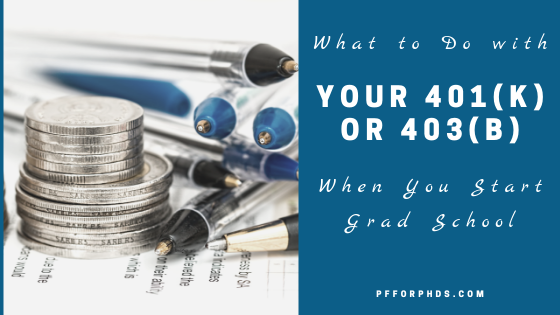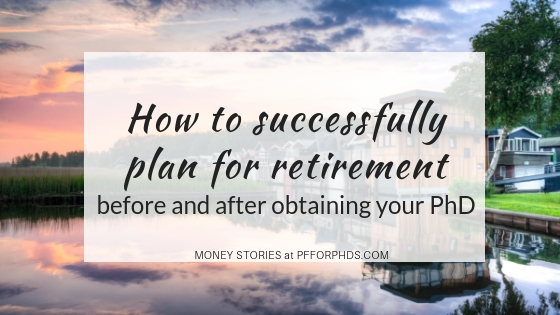One of the common perks that companies and organizations give to their employees is access to a workplace-based retirement account such as a 401(k) or 403(b). They may even match your contributions to a degree! Unfortunately the great majority of universities do not give their graduate students access to their 403(b)s. (This does happen rarely, so it’s worth inquiring about.) If you had a 401(k) or 403(b) in a prior job, what do you do with that account when you leave your job for grad school?
Further reading: Financial Reasons to Work Before Starting Your PhD
Your Three Options for Your Workplace-Based Retirement Account
In general when you leave a job, you have three options for what to do with your 401(k) or 403(b).
Leave It Where It Is
Most of the time, your former employer will permit you to leave your 401(k) or 403(b) where it is and continue to manage the account for you while you are in grad school. Employers usually have a minimum balance requirement to maintain these accounts, so your account has to meet that bar.
The upside to this approach is that you don’t have to do anything, and if you liked the investment options and account fees, you can keep using it.
The downside to this approach is that you have to stay in some degree of contact with your former employer and go through them if you want to make any changes to the account.
Roll to Your New Workplace-Based Retirement Account
If you have the option to open a 403(b) with your university, you may be able to roll your previous 401(k) or 403(b) into that account. Again, this opportunity is rarely extended to grad students.
Roll to an IRA
You always have the option when you leave a job to roll your 401(k) or 403(b) into an Individual Retirement Arrangement (IRA). An IRA’s tax advantages are similar to those of a workplace-based retirement account, but you manage the account yourself instead of your employer managing it. Be sure that you have instructed your firms to execute a “rollover” directly to your IRA and not to cash out your account and send you a check, which would be a hassle to correct. You can use an existing IRA account or open an IRA account specifically to receive this transfer.
Which Option Should You Choose?
The general personal finance advice is to always roll your 401(k) or 403(b) when you leave an employer to avoid eventually having accounts scattered across many employers and potentially losing track of one. Whether you should roll into your new employer’s 401(k) or 403(b) or your IRA is debated. If you are trying to optimize the investments inside your retirement account, IRAs have an advantage because the entire world of investment options is open to you, whereas the options inside a 401(k) or 403(b) are only what your employer decides to make available. Sometimes, 401(k) or 403(b) plans are more expensive than what you can get inside an IRA, and since cost minimization is a key tenant of successful investing, again IRAs are preferred.
However, this general advice is not necessarily fully applicable to grad students.
First, your options are mostly likely to be either to leave your 401(k) or 403(b) where it is or to roll it into an IRA.
Second, you may not want to manage your own investments. While managing your IRA can be easy and hands-off, it may still be intimidating, and some students might prefer to simply choose among the options offered by the former employer to opening and managing an IRA.
Third, the investments available to an individual investor inside an IRA may not be as attractive as the institutional-level investments available inside a 401(k) or 403(b) in terms of their fees. To paint with an overly broad brush, 401(k) and 403(b) options at smaller companies and organizations may be more expensive than what you can buy inside an IRA, whereas 401(k) and 403(b) options at larger companies and organizations may be less expensive than what you can buy inside an IRA. So if you were employed by a university or a large company before starting grad school, compare the cost (expense ratios) of your current investment options with those at the brokerage firm you’re considering for your IRA. It may turn out that your existing options are more favorable.
Further reading:
- Don’t Make These Investing Mistakes
- Investing Strategies to Grow Your Wealth During Your PhD Training
My advice to entering grad students is to roll your 401(k) or 403(b) into an IRA unless you have high-quality, inexpensive investment options inside the workplace-based retirement account and do not want to manage your own account.
Other Advice Related to Retirement Saving
You’re on a great path already by starting to invest for retirement through your job. If at all possible, continue to make excellent choices related to retirement investing during grad school.
Contribute Money to Your 401(k) or 403(b) While You Still Can
It’s a great idea to kick your retirement savings rate into an even higher gear in the months you have left at your job. You’re likely to not have access to a 401(k) or 403(b) again for quite a while, so any additional money you can get into that tax-advantaged account will be a huge boon to your post-PhD self. (Plus, you’re forcing yourself to deflate your lifestyle, which you’ll have to do in a few months anyway!)
However, don’t become so zealous about retirement saving that you compromise your cash position. It’s going to take a good amount of cash to transition into grad school between moving costs, start-up expenses, and university fees. You don’t want to put a lot of money inside your 401(k) or 403(b) only to turn to credit cards to make it until your first grad school paycheck.
Keep Investing for Retirement!
Yes, it is sometimes possible to invest for retirement during grad school, but it heavily depends on your stipend, the local cost of living, and the rest of your financial situation. If you have no pressing debt, enough cash savings for emergencies and short-term expenses, and some excess cash flow, please continue to invest for retirement!
Further reading:
- Everything You Need to Know About Roth IRAs in Graduate School
- Should a Graduate Student Save for Retirement in a Roth IRA?
If you have W-2 income as a grad student (typically from an assistantship) in a given calendar year, you can contribute to an IRA. If you don’t have IRA eligibility due to receiving only non-W-2 (typically fellowship) income in a given calendar year, don’t let that stop you from investing for retirement! You can still use a taxable brokerage account. Between tax-efficient investments and your low tax bracket, you are likely to still enjoy tax benefits of investing even outside of an IRA.
Further reading:
- Grad Student Tax Lie #9: If You Have an Income, You Can Contribute to an IRA
- Fellowship Recipients Can Save for Retirement Outside an IRA
Consider Traditional to Roth Conversion During Grad School
During your time in grad school, you may be in a lower tax bracket than you were while at your previous job. Grad students, unless married to someone with a much higher income, are usually in the 12% marginal tax bracket at the highest.
If you have any money in a traditional 401(k), 403(b), or IRA (which you certainly would if you ever received a retirement contribution match from your employer), consider converting it from traditional to Roth during your lower-earning grad school years. It’s pretty unlikely that you’ll ever be in the 12% (or lower) tax bracket again after you finish grad school due to both your personal earning potential and today’s rock-bottom income tax rates, so it makes sense to do the conversion at that low tax rate to gain the benefits of a Roth IRA. (People are flocking to do this type of conversion even in much higher tax brackets!)
Further reading: Why the Roth IRA Is the Ideal Long-Term Savings Vehicle for a Grad Student
When you do the conversion, you’ll have to pay income tax on the full balance of your traditional retirement account. Before you start the conversion process, be sure that you 1) have enough cash to pay the tax and 2) are not bumping yourself into a higher tax bracket with that income infusion.
You don’t have to rush to do this in your first full calendar year as a grad student if you’re not ready, but you should do it as early as you can, and keep an eye on that year in which you expect to finish and get a higher-paying job.
This conversion can be slightly complicated if you only want to convert part of your traditional money in any given year, so be sure to discuss your plans with the brokerage firm that houses your IRA.
Conclusion
Great job on contributing to a 401(k) or 403(b) prior to starting grad school! The positive financial habits you’ve already cultivated will serve you well during and after grad school. If you want to take any steps at all with your existing workplace-based retirement account, they are quite straightforward and easily accomplished.


